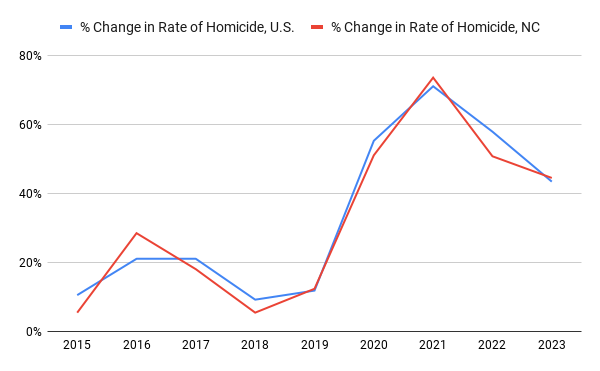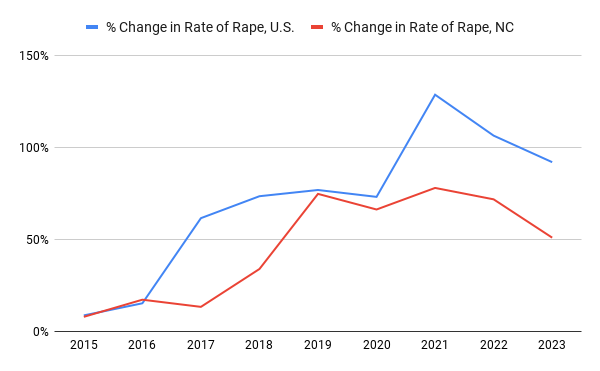Rep. Dan Bishop (R-N.C.)—the author of the state’s infamous bathroom bill, a fan of calling abortions “infanticide,” and the man who recently said “lawfare” against former President Donald Trump is “as bad as it was [for Black people] in Alabama in 1950”—faces the camera, warning of wokeness.
“If you don’t feel safe, there’s a reason,” Bishop says. “Violent crime is up. More rapes and murders. Record illegal immigration. The cause? Woke crime policies. Defund the police. Open borders.”
In an ad that reflects the tone of the race in North Carolina, Bishop’s argument is simple: He wants to be the state’s “law and order” attorney general. Such an approach would be a shift. North Carolina has not had a Republican attorney general in modern history. A win for the congressman would have major implications for the state’s politics, not only on criminal justice but also in checking the power of a state legislature that has lurched increasingly to the right over the last decade.
But his argument that the state is suffering from out-of-control crime has a few flaws.
The North Carolina police have not been defunded; after 2020, many local police budgets increased. While initially immigration surged under President Joe Biden, it has fallen dramatically after a crackdown. And there is no evidence that crime increases are driven by undocumented immigrants.
The claim he makes that is most directly related to the job he hopes to win concerns the overall rate of violent crime. In the ad, behind Bishop, is a simple graph: two arrows point up, showing that rapes increased by 55 percent and murders by 32 percent. Under Democrats, the GOP says, the nation has become a place of violence. You are being attacked, and they don’t care.
The truth is more complicated. A Mother Jones analysis found no configuration of data that matched these numbers. Bishop’s analysis for both rapes and murders appears to use counts, instead of rates, discounting population change, which is not best practice. And, oddly, even if using counts, the math seems to be slightly askew.
North Carolina’s rates for murder and rape match overall trends for the country generally, making the argument that Democrats caused unique challenges in the state iffy. After continual rises from 2017 to 2020, with a major uptick during the pandemic, rape and murder rates have fallen in North Carolina—and across the country. Violent crime did rise over the past 10 years, notably, but Bishop’s statistics don’t represent the trend in context and seem to involve errors. (Bishop’s campaign did not respond to multiple calls requesting comment.)


In a normal election year in North Carolina, stretching of the truth, inaccurate data on a central campaign issue, and Bishop’s pugnacious style would command some attention. But during this campaign season, voters and the media seem to find it challenging to have time, despite the importance of the race. The Democratic AG over the past decade has consistently put constraints on the power of the GOP-dominated state legislature’s enthusiasm for enacting extremist laws.
“Early on, we expected this to be a really hotly contested, nasty, expensive race,” Christopher Cooper, a political science professor at Western Carolina University and author of Anatomy of a Purple State, told me. “But there’s just not been much oxygen left in the room for this incredibly important, incredibly competitive race.”
“There’s just not been much oxygen left in the room for this incredibly important, incredibly competitive race.”
One major source of the oxygen drain has been the governor’s contest. In September, CNN revealed GOP gubernatorial candidate Mark Robinson’s provocative postings on the website “Nude Africa,” plunging his campaign into a double-digit deficit. The story broke just weeks after Vice President Kamala Harris floated the possibility of Gov. Roy Cooper as a potential vice presidential pick. And, soon after, Hurricane Helene ravaged the western half of the state. (In the wake of the storm, the Republican-dominated state Supreme Sourt allowing Robert F. Kennedy Jr.’s vanity project of a campaign to mess with ballots became more significant.) Add to this the fact that North Carolina is not just a close swing state but, under certain Electoral College calculations, could decide the presidential election.
The battle to become the state’s next AG pits two sitting congressmen against each other and has become the most expensive race for that office in history. Jackson is a moderate Democrat who has become a TikTok regular, known for explaining his policies in social media monologues to the camera. Gerrymandered out of his current district, he has run on the traditional platform of a centrist: anti-crime, pro-family, many references to his suburban-friendly biography as a veteran and former prosecutor.
With a vocal Freedom Caucus backbencher in Congress against a Democrat who loves to use social media, the hotly contested race was expected to attract attention. Bishop is one of the 20 Republicans who voted against former House Speaker Kevin McCarthy (R-Calif.) and has challenged the results of the 2020 election.
Robinson’s harlequin forum posting also may have prematurely decided the governor’s race, thereby making the AG election a contest that could fundamentally change the state’s political identity. Current Attorney General Josh Stein, a Democrat who appears to be heading for the governor’s mansion, won the position with 50.1 percent of the vote in 2020. (It was only 3,000 voters away from a potential recount.) Before Stein, Cooper held the AG spot for over a decade.
Since 2010, Republicans have had near-complete control of the General Assembly—the state’s legislative branch—and have tried to implement myriad right-wing goals. State lawmakers’ efforts to achieve key policy objectives—such as voter ID and the infamous anti-trans bathroom bill authored by Bishop—have been slowed by Democratic attorneys general.
“This is a position that matters,” Cooper, the professor, said. “And it particularly matters in an inter-party dynamics.” The AG job “would allow [Bishop] to litigate things like voter ID” and “to defend the Republican General Assembly in court.”
If Stein wins the governorship, veto power will be in place. But since Gov. Cooper’s first win in 2012, a Democratic governor and attorney general have created an underappreciated dual check on North Carolina’s rightward lurch.
North Carolina is seen as a somewhat gentlemanly Southern state with a progressive bend, as political scientist V.O. Key Jr. famously noted back in 1949. In 2020, former President Donald Trump won North Carolina by his smallest margin of victory in any state. But its current status as “purple,” as Cooper explained, is because “there’s about half [of voters] that are pretty bright blue and about half that are pretty bright red.”
Even though North Carolina has not elected a Republican attorney general since 1896, members of both parties consider it to be the launching pad for the governor’s office. Outgoing Gov. Roy Cooper and likely incoming Gov. Josh Stein—as well as former Gov. Mike Easley—were all attorneys general. “The joke is that the AG stands for aspiring governor,” Cooper, the professor, noted.
Both Bishop and Jackson are ambitious members of Congress hoping for a greater role on the national stage, which they would enjoy as a state AG. Such positions offer a history of headline-making lawsuits on election results, social media, and drugs. One can easily imagine Bishop issuing threats concerning election integrity, following the path forged by other Republican attorneys general across the nation over the past four years challenging the veracity of the 2020 election.
“The General Assembly has ruled with an iron fist, and has absolutely changed the state in some fundamental ways,” Western Carolina University’s Cooper explains. “It’s changed the power dynamics of institution versus institution.” In the end, a victory by Bishop could upend North Carolina’s centrist political identity.
Melissa Lewis contributed data analysis and reporting.






